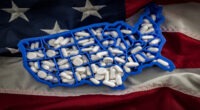BMS, BioNTech in $11-Bn Oncology Drug Pact
Bristol Myers Squibb (BMS) and BioNTech, a Mainz-Germany-based bio/pharmaceutical company, have entered into an agreement for the global co-development and co-commercialization of BioNTech’s investigational bispecific antibody, BNT327, across numerous solid tumor types, in a deal worth up to $11.1 billion ($1.5 billion upfront, $2 billion in non-contingent anniversary payments, and $7.6 billion in milestone payments).
BioNTech’s BNT327, a bispecific antibody candidate targeting PD-L1 and VEGF-A, is currently being evaluated in multiple ongoing clinical trials, including global Phase III trials as a first-line treatment in extensive-stage small-cell lung cancer and non-small cell lung cancer. A global Phase III trial evaluating the candidate in triple negative breast cancer is planned to start by the end of 2025. Preliminary data from ongoing trials show the potential for combining anti-PD-L1 and anti-VEGF-A, two well-established therapeutic targets, into a single molecule to treat multiple tumor types, according to the companies. BNT327 combines PD-L1 checkpoint inhibition aimed at restoring T cells’ ability to recognize and destroy tumor cells with the neutralization of VEGF-A. The blocking of VEGF-A is aimed at reversing the tumor’s immuno-suppressive effect in its microenvironment and cutting off the blood and oxygen supply that feeds tumor cells (anti-angiogenesis effect), with the intention of preventing the tumor from growing and proliferating.
Under the agreement, the companies will jointly develop and commercialize BNT327, including the development of BNT327 as a monotherapy and in combination with other products. Both companies have the right to independently develop BNT327 in further indications and combinations, including combinations of BNT327 with proprietary pipeline assets.
BMS will pay BioNTech $1.5 billion in an upfront payment and $2 billion total in non-contingent anniversary payments through 2028. These tax-deductible charges will be recorded as acquired in-process research and development expense when incurred, with the $1.5 billion being incurred in the second. In addition, BioNTech will be eligible to receive up to $7.6 billion in additional development, regulatory, and commercial milestones. BioNTech and BMS will share joint development and manufacturing costs on a 50:50 basis, subject to certain exceptions. Global profits/losses will be equally shared between BioNTech and BMS.
Source: Bristol-Myers Squibb and BioNTech


